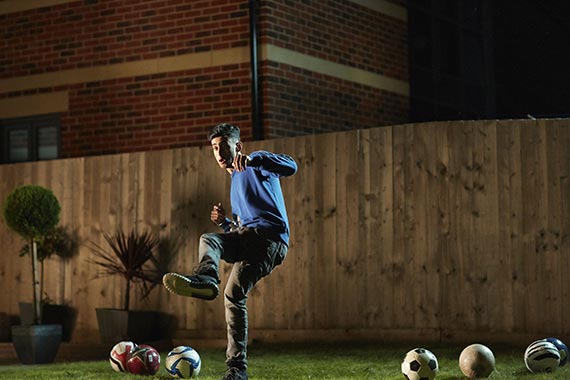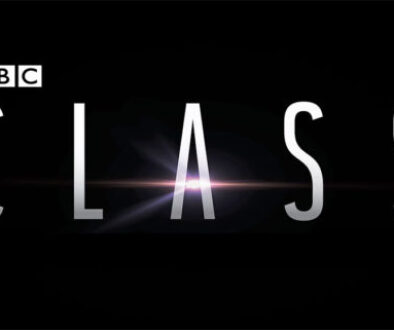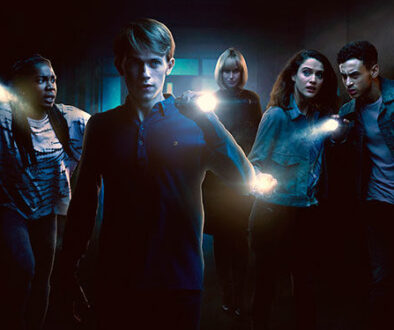Class: Episode 2 “The Coach With the Dragon Tattoo” Review

Clint Hassell gives his verdict on Doctor Who’s new spin-off.
Note: this review contains full spoilers for the second episode.
It is to Class’ benefit that BBC Three released its second episode, “The Coach With the Dragon Tattoo,” immediately following the premiere. By viewing both together, not only is the audience allowed to see an episode that is free from the constraints of having to establish an ongoing series, but another of Class’ attributes becomes readily apparent: by having noted young adult novelist Patrick Ness script all of the episodes, Class is able to organically revisit previous plot developments and foreshadow coming events in a way that tightly interconnects the eight-episode series.
The episode’s depiction of Ram’s anguish over losing both his girlfriend and his leg is captivating and necessary – – Ram being the character most affected by the events depicted in the premiere. Yes, the narrative cuts to shots of Rachel dying in four different scenes, and the episode’s resolution ties a little too neatly into Ram’s emotional development. However, considering the expense of portraying an actual physical fight between the cast and a computer-generated dragon, it is difficult to fault Ness’ writing within the constraints of the series’ budget, even if the episode’s denouement reeked of “killing the Cybermen with love.” Was the rest of the cast underutilized? Oh, sure – – only Tanya provided any impetus for Ram’s story arc, and none of the other characters factored into the dragon’s defeat. However, this needed to be Ram’s episode, lest the series struggle to carry the emotional baggage of such a damaged character. That Patrick Ness was able to parlay this narrative necessity into legitimate character development shows his strength as a scriptwriter.

Ram and Tanya’s relationship continues to develop into the series’ most layered. The parallel between Tanya beginning to talk to her brothers about their father’s death and Ram finally reaching out to April and Charlie is handled with remarkable subtlety. The message that it is easier to talk with someone who has shared your experience is conveyed without being preachy – – something The Sarah Jane Adventures excelled at.
It’s especially gratifying to see that Tanya’s attempts to hack into U.N.I.T.’s computer system are an ongoing project, and not something that she is able to do with a few keystrokes – – a terrible cliché. This almost makes up for the multiple narrative shortcuts taken by the script in “For Tonight We Might Die.” Introducing Tanya’s continuing efforts into early storylines actually allows for more storytelling possibilities as the script teases their progression, and it will feel much more earned when the U.N.I.T. connection finally pays off.

Also remarkable: rather than attempting to wring drama out of the clichéd plot line of Ram hiding his bionic leg from his father, the episode dispenses with the matter entirely, allowing Ram to have a frank discussion with Varun. This not only elevates Varun above the negative images associated with most of Class’ adult characters (controlling, absentee, ineffectual, mean-spirited, etc.) it allows Varun and Ram’s relationship to play a greater role in Class’ more-developed narrative. This can only be a good thing.

Less well served, this episode, is Miss Quill, who continues to be Class’ least developed character. Ness has done little to differentiate Quill from the long line of “tough females dressed like sexy librarians,” ripped from Steven Moffat’s playbook. Quill’s conflict with the Inspector is played for laughs and feels very disjointed from the bleak tone of the rest of the episode, serving only to foreshadow coming threats. It is telling that award-winning actress Katherine Kelly is able to do little to elevate Quill above scene-chewing, moustache-twirling, would-be villainess.


A final question: what is Class’ intended audience? The series seems to straddle an impossible line between Torchwood’s bleakness and The Sarah Jane Adventures’ focus on youth. While “S–t!” is certainly an appropriate response to being attacked by a Shadow Kin warrior, Ram calling Charlie “d—face,” Quill’s suggestion of porn, and Ram’s “spanking it” retort all seem scripted merely to test the boundaries of what is appropriate for a young audience. “I caught my husband fiddling with himself on the stairs,” says an elderly lady in the series premiere, apropos of nothing; what is that line except a blatant attempt to label Class as “adult”?
The tonal disparity extends to Class’ use of gore and nudity. Ironically, “The Coach With the Dragon Tattoo” acknowledges that a naked man is not an appropriate thing for a teen to see, yet, the teaser pointedly displays such nudity in a series being marketed towards Doctor Who’s younger audience. This is less of an issue in the United States, where Doctor Who is considered a trendy show for adults. Realizing that Class’s depictions of profanity, violence, and teen smoking will necessitate a TV-MA rating (“for mature viewers”), BBC America is holding the series until 2017, when it can be paired with Doctor Who Series 10. How will Class be received in countries where Doctor Who is considered children’s programming? While it is understandable that a series which deals honestly with teen characters on the cusp of becoming self-actualized adults would certainly have some material not meant for young children, some of Class’ content seems less an organic depiction of the teen experience and more a blatant attempt to appeal to a larger demographic than the show’s narrative would dictate.







